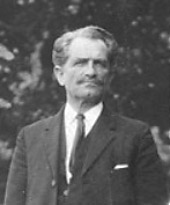Boris Sidis
Boris Sidis (born October 12, 1867 in Berdychiv , Russian Empire , today Ukraine ; † October 24, 1923 in Portsmouth (New Hampshire) , USA ) was an American psychologist , psychiatrist and psychopathologist of Jewish-Russian origin.
life and work
Sidis was arrested by the tsarist police at the age of 17 because he campaigned for the schooling of Russian farmers. In 1887 he emigrated to the USA, where, after five years of a precarious life, he succeeded in studying philosophy at Harvard University . Another five years later he received his doctorate there . He won the support of William James , who wrote a foreword to his first book The Psychology of Suggestion (1898).
From 1896 to 1901 Sidis was an associate psychologist and psychopathologist at the newly established Pathological Institute of the New York State Hospitals, where he experimented with hypnosis and developed his view that psychosis can be attributed to "mental dissociation". In 1902 he published Psychopathological Researches. Studies in Mental Dissociation , 1905 based on a case history of Multiple Personality .
In 1904 he began studying medicine at Harvard University, which he also completed with a doctorate in 1908. At the same time he worked as a psychotherapist and did research. In 1907 he published Studies in Psychopathology , 1909 An Experimental Study of Sleep on sleep as a protective mechanism.
In 1909, with the support of a patroness, he founded the Sidis Psychotherapeutic Institute , a sanatorium in Portsmouth, New Hampshire , where he worked until his death. After he had approached the Freudian view of the unconscious in The Psychology of Laughter of 1913 , he subsequently took a critical position against it. From 1914 to 1916 there were three fundamental works on psychopathology: Symptomatology, Psychognosis, and Diagnosis of Psychopathic Diseases (1914), The Foundations of Normal and Abnormal Psychology (1916) and The Causation and Treatment of Psychopathic Diseases (1916). He also published regularly in the Journal of Abnormal Psychology , of which he was co-editor. In 1922 he summarized his research results in Nervous Ills: Their Cause and Cure again.
Sidis fought World War I as a social disease. He saw fear as an essential cause of psychological suffering and at the same time emphasized its evolutionary role as a survival mechanism.
With his wife Sarah Mandelbaum Sidis, whom he married in 1894, Sidis had two children whom he raised on the basis of his psychological knowledge. His son, William James Sidis , was known as an eccentric genius.
Sidis died of a brain hemorrhage.
Web links
- Boris Sidis Archives with photos and further links
- Boris Sidis: Biographical Sketches. Biographical sketches of relatives and friends
| personal data | |
|---|---|
| SURNAME | Sidis, Boris |
| BRIEF DESCRIPTION | American psychologist, psychiatrist, and psychopathologist |
| DATE OF BIRTH | October 12, 1867 |
| PLACE OF BIRTH | Berdychiv , Ukraine |
| DATE OF DEATH | October 24, 1923 |
| Place of death | Portsmouth , New Hampshire, USA |
